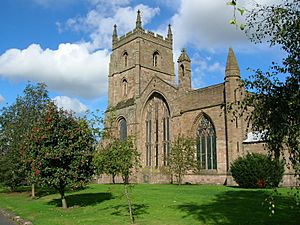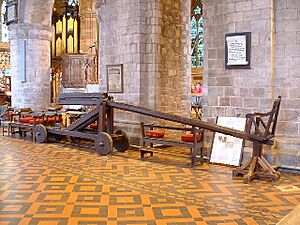Priory Church, Leominster facts for kids
Quick facts for kids The Priory Church, Leominster |
|
|---|---|

Leominster Priory
|
|
| Denomination | Church of England |
| History | |
| Founder(s) | Reading Abbey |
| Architecture | |
| Style | Norman and later styles |
| Administration | |
| Diocese | Diocese of Hereford |
The Priory Church in Leominster, Herefordshire, England, is a very old and important church. It is dedicated to Saint Peter and Saint Paul. This amazing building was first built around the 13th century for a group of monks called Benedictines. Before that, there might have been an even older Anglo-Saxon monastery on the same spot.
In 1539, a big change happened. The east part of the church and most of the monks' buildings were destroyed. Luckily, the main part of the church was saved. Later, between 1872 and 1879, new supports called quatrefoil piers were added inside. The church is now a Grade I listed building, which means it is very important and protected.
The Church Bells
The Priory Church has a special set of ten bells. Eight of these bells were made in 1755 by William Evans in South Wales. They were brought to Leominster by boat along the rivers Wye and Lugg. It is very rare to find another complete set of eight bells made by William Evans at the same time.
In 1894, two new bells were added, making a total of ten. These new bells were made by John Warners of London. The largest bell, called the Tenor, weighs about one metric ton. It rings in the musical note of E-flat.
Exploring the Churchyard
In 2005, people explored the area north of the church. They found where the cloister used to be. A cloister is a covered walkway, usually found in monasteries. Most of the stone from the cloister was taken away after the monasteries were closed down a long time ago.
Scientists found old animal bones in the churchyard. They used a method called carbon dating to find out how old the bones were. The bones showed that people lived in this area in the 7th century. This fits with the story that a Christian community was started here around 660 CE. A monk named St. Eadfrith, from Lindisfarne, is said to have founded it.
The churchyard is also a burial place. You can find graves and memorials for members of the Kemble family, who were famous actors. Sarah Siddons, a very well-known actress, had her grandparents buried here. There is also one war grave for a soldier from World War II.
Interesting History
The Priory Church has a connection to some of the earliest known women doctors in England. Their names were Solicita and Matilda Ford. We know about them from old documents from the late 1100s. These documents show that they both signed their names as medica, which means "doctor" in Latin.


